History of Richmond Rowing Club
The Golden Years
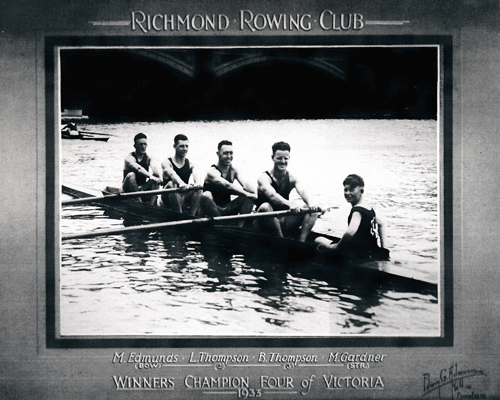
RRC Victorian Champion Four, 1933
The Richmond Rowing Club today is a relatively small club compared to those clubs who dominate the sport in Victoria. It was not always so.
Mr Win Podmore was elected to the presidency of the club at the end of the Great War and held that position until 1954. Under his presidency the club was to become a genuine power in Victorian and Australian Rowing from the mid-twenties through to the late thirties.
The Richmond phoenix arose from the ashes of the disastrous fire of 1926 to achieve an honour that many thought a dream - the club's first Junior Premiership. Coupled with taking possession of a new club house at the beginning of the year, these two achievements marked 1928 as a defining year in the club's 65 year history.
The sign of better things to come were also highlighted by the club's equal 3rd place in the Senior Premiership and selection of two Richmond members to the 1928 King's Cup squad. However, success takes time and hard work and 1929 was not the instant success that they had dreamed. The Great Depression hit and although it was to wreak havoc across the world for the next ten years Richmond Rowing Club showed its character and spirit and came through fighting. In fact from 1929-1930 the number of registered members swelled from 100 to 124 as new recruits were attracted to the club.
The club was now bursting at the seams with new members and an ever increasing fleet. This was thanks to a racing eight donated by The Ladies Committee and purchases by the Committee of two practice eights, a racing four, a tub pair and a tub scull. Orders were also placed for another racing four and another racing eight. The club had its sights set on success at all levels.
The Committee, in pursuing a policy of stimulating interest in club races. instituted a points competition for club races. This may have been the starting point for the Mal Scott Memorial Shield and was referred to simply as the "'Points Competition'". One major club race event was the Richmond Combination Fours, held on Eight Hours Day, 23rd April 1930. Rowers from other clubs were invited to enter this event and a total of 22 scratch fours were selected out of the Race Organiser's Hat.
Even though it would not have recognised itself as such in those days, Richmond Rowing Club was truly a community based club. It welcomed allcomers !male only of course] to try out the sport and would be rewarded with great success for this policy in the coming years.
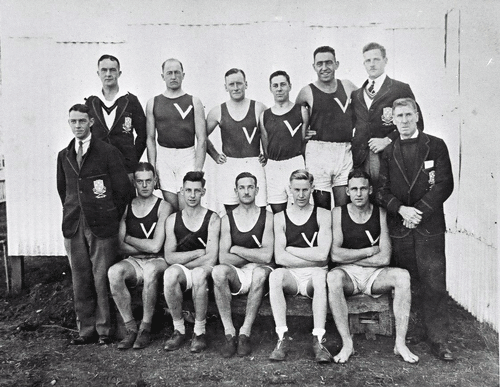
Victorian Crew King's Cup 1930
1930 was a year to remember for Victorian rowing. Two key members of the Richmond Rowing Club, Ben Thompson and Lochie Thompson represented the state with pride in the two and three seats of the Australian Champion Eight. They brought the championship to Victoria for the first time since 1912 and the Kings Cup Trophy to Victoria for the first time.
In every Kings Cup regatta of the 1930s, Richmond had members representing Victoria, many taking line honors.
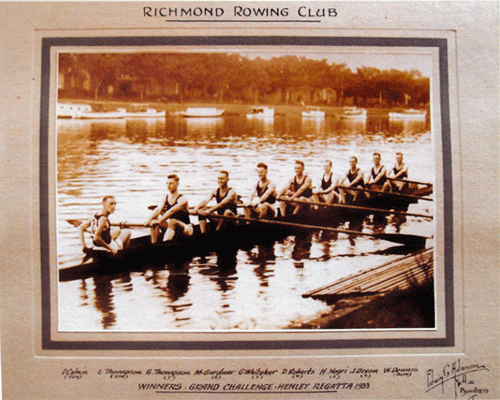
Winners Grand Challenge Cup Henley Regatta 1933
The hard work and investment the club had made began to bear fruit in 1931 as winning momentum began to build with the club's first ever victory in the Champion Eights on the Lower Yarra Course
[downstream from Spencer Street Bridge over a distance of 2½ miles/ 4km. This was the first senior eight win in the club's history and the crew was stroked by the great Jim Barton, former champion State and National Sculler. He followed this effort with a win in the One Mile Sculling Championship, marking his reappearance in Victorian sculling after a long absence.
But not satisfied with those efforts, he also stroked a Club Senior Four to a win at the Sale Regatta for that season. A total of 9 championship wins were recorded in that season, an equal number to that of the Premiership winners, leaving Richmond just one point short of the top spot. It seemed premiership success was surely just around the corner ...
In 1932-1933, for the first time in its seventy year history Richmond Rowing Club claimed a premiership title, that of Victorian Senior Premiers. The years of hard work and dedication had finally paid off in perhaps the most difficult economic conditions Australia as a nation had ever experienced. This convincing win at senior level was underlined by a fighting effort with the Club coming in equal second for the Junior Premiership. Unfortunately we cannot name every winner here but major regatta wins came at many of the popular events we still enjoy today - Melbourne (Gilbey Cup), Henley (Grand Challenge Cup). Footscray, Ballarat and Nagambie.
The year is 1934 and for the second year in a row the Richmond Rowing Club takes out a premiership, this time the junior premiership, the culmination of another 12 months of hard work and dedication by a lot of people, both on and off the water.
This premiership win was marked by the clubs domination of the competition - 15 wins for 91 points with the second place getter achieving 8 wins for 32 points. The wins contributing to this title included nine victories in eights including the Henley Regatta Founders Challenge Cup for Junior Eights. The total points achieved by the club was only 3 points less than the all time record for points gained by Banks Rowing Club to win the Junior Premiership in 1909-1910.
Lachlan J. Thompson
Birth year unknown; died 1983
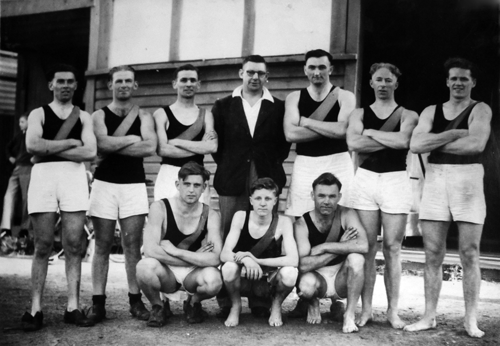
Lochie Thompson as coach of a Richmond crew after an Australian Henley win C1940
He was a champion rower in the 1930s earning seats in the victorious Richmond and Victorian crews of that era. Lochie represented RRC in the Interstate Men's Eights Championships during the 1930s before becoming a selector for the competition.
Lochie was an office bearer of the club and coached many crews to victories during the club's 'golden years', when it won many championships and premierships in the 1930s.
Lochie Thompson was the selected coach for the 1950 Empire Games crew but could not travel to New Zealand, where the crew won the gold medal. It was therefore a sad ending to a great career as an oarsman , selector and coach.
He did not coach after the 1950 Empire Games.
Although finishing third in the senior premiership the club won the Henley Regatta Grand Challenge Cup for the second year in a row and the Champion Pairs for the first time.
1935 was again a year for the juniors to be proud, for the second successive season Richmond were crowned Junior Premiers with 11 wins plus the Junior Eight Championship. For the seniors the club continued to be well represented at state level. The 1935 Kings Cup Eight boasted two Richmond rowers in the crew (L Thompson and E Lindsay). plus the coxswain (Tom Croft) and the Coach (George Hutton). The club was indeed one of the elite clubs of this era.
However, the standard and expectation now demanded by Richmond marked this as a fairly ordinary year - whereas only 5 years earlier the results would have been considered outstanding. Lessons were well learnt from the 1935 season and 1936 was when the mountain would be climbed and conquered. Richmond Rowing Club - champion in both Senior and Junior Divisions!
The championship double had only been accomplished three times before in the history of Victorian rowing - Albert Park 1906-07 and 1912-13 and Mercantile in 1926-27. Richmond was now
Junior Champion for the 3rd year in a row. This was the first time three successive premierships had been achieved in Victoria and Richmond was the only club up until that time with four junior premierships. Everest had indeed been conquered. In the Senior Division no Richmond eight was beaten over a one mile course for the whole season - 5 one mile races for 5 wins. The only shadow on this achievement was no wins in a championship event. The Junior Division saw 18 wins to Richmond which included 6 maiden eight wins, two junior eight wins and Champion Junior Eight for the second year in succession.
At the close of the season Mercantile Rowing Club hosted a "smoke social" for Richmond in honour of the club's twin success . ''. .. Richmond members are very appreciative of the goodwill extended by Mercantile. The best tradition of the sport of rowing is good fellowship ....".
The club had reached a pinnacle of success both on and off the water in its 73rd year.
There may have been some sparse years since these "glory days" but there have also been some amazing victories, fun times and there is no doubt the spirit and character of Richmond Rowing Club is still as strong as ever.
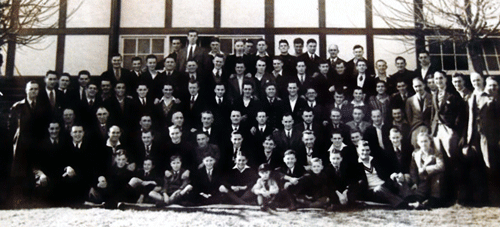
Richmond Rowing Club, Senior and Junior Premiers of the Victorian Rowing Association, 1930
Mal and the Boys
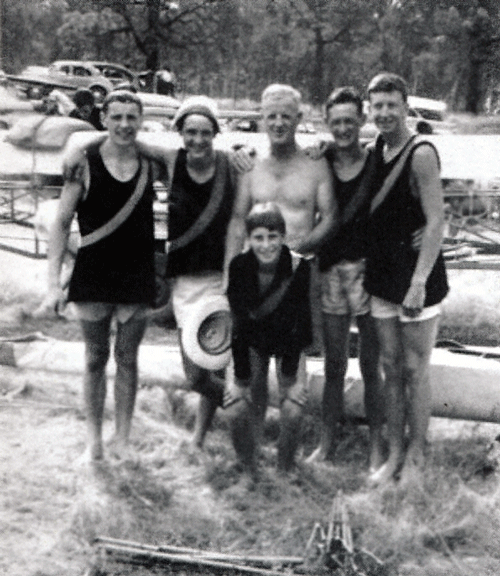
When I first arrived at the Club, I got some advice from a member called John:
"It takes a while to learn but believe me, it is worth the effort. Different people will coach you here and give you rowing tips. By all means, listen, and respect what they say but take particular notice of one man. His name is Mal. He is the only man who really counts in our club, our King's Cup oarsman, an incredible man. So if you get selected into Mal's crew, you are doing well. I hope you succeed."
During my first months at the club as a beginner, I had little contact with Mal. I often saw him with his four: training in the boat, in the gym, on the lawn outside the club - always together. There were several crews in the club but only one coached by Mal. I looked with envy on the chosen.
Springtime came to the river. It was time for the selectors to choose crews for the next season, a nervous time for rowers. The die was cast. I was placed in a new four with a powerful crew including John and...coached by Mal. This was a surprise, a great joy and the beginning of a long friendship. I had no idea how I earned such a distinction. The boys commented philosophically that Mal knew what he was doing, he could pick an oarsman.
From many training sessions one particular image of Mal comes to mind. It was a windy, wet and miserable evening. The temperature was barely above zero. Mal stopped at a jetty, holding his bike in one hand and a megaphone in the other, gave instructions shouting over the wind and storm. The megaphone was of little help. In spite of his close distance from the boat, we could hardly hear him.
"John, don't jerk the oar out of the water, and keep your head up. Two keep your legs down and reach out. The whole crew, more concentration, think of your work!"
He was right. We couldn't concentrate seeing his lonely silhouette against the dark grey background, hardly discernible from the pouring rain. He was thoroughly soaked and must have been freezing, a fact he completely ignored. And yet this seemingly pitiful figure emanated strength and will which left a lasting impression on us.
Much later we understood what he meant by his 'nose' and whom he selected for his crews: 'you are a terrible oarsman, but you have a heart in the right place' - he once said to one of the boys. And when he found this heart, he knew how to prepare it for a fight. Once, after a particularly exhausting session in forty degrees heat, he gathered us in the shade and asked if we had read Kipling's poems. We shook our heads - so listen to this - he lowered his voice to a whisper:
'...if you can force your heart, your nerve, and sinew
To serve your turn long after they are gone,
And so hold on when there is nothing in you
Except the will which says to them: Hold on!...'
Mal was no poet but when we stood there exhausted and sweaty, holding the oars in our hands, we thought that the master himself spoke to us in our language, directly to our hearts.

